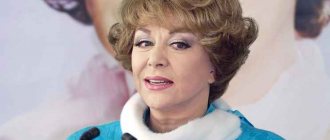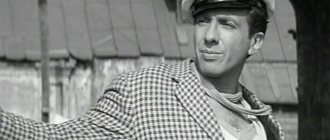Biography of Sergei Solovyov
Sergei Aleksandrovich Solovyov is a Soviet and Russian film and theater director, screenwriter and TV presenter, who directed such pearls of Russian cinema as the dramas “The Station Agent”, “One Hundred Days After Childhood”, “Melodies of the White Night” and, of course, the film “Assa” , which marked the beginning of Perestroika. He has a reputation as a person who has an excellent sense of youth, which is once again confirmed by his latest works: “Odnoklassniki” and “Ke-Dy”.
Solovyov Sergey Alexandrovich
Childhood and adolescence
The future cult director was born on August 25, 1944 in the Karelian city of Kem, where his grandparents were exiled in the 30s. My grandfather was subsequently shot. Mom, Karelia Sergeevna Nifontova, went through the Patriotic War and was a front-line hero. Father, Alexander Dmitrievich, was a military intelligence officer and after the war he moved with his family to the capital of North Korea, where he became an adviser to Kim Il Sung.
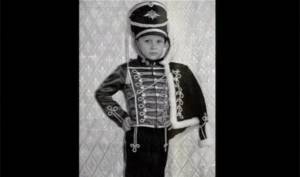
Sergei Soloviev in childhood
When Seryozha was six years old, the family returned to their homeland and settled in Leningrad. Soloviev Jr. went to school and did not particularly stand out among the other Leningrad boys. He studied at school No. 167, for all ten years he sat at the same desk with Lev Dodin, the future famous theater director. As a teenager, he accidentally got an audition for the Bolshoi Drama Theater: director Igor Vladimirov approached him on Nevsky and invited him to audition. So 14-year-old Sergei was selected from several dozen schoolchildren to participate in the play “The Endless Dali” based on the play by Nikolai Virta and ended up on the stage of the famous theater as part of the troupe of the famous Georgy Tovstonogov. And although before that the boy dreamed of becoming a submariner, since then he increasingly began to think about a different kind of future. Together with Dodin, he enrolled in a youth theater group.
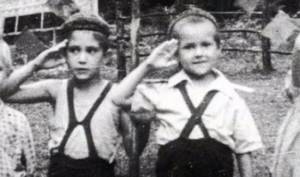
Sergei Solovyov and Lev Dodin in childhood
Around the same time, he watched the poignant war drama “The Cranes Are Flying” with Alexei Batalov and Tatyana Samoilova and was so inspired by the impressive work of Mikhail Kalatozov that he decided to become a director. After school, the young man got a job as a presenter of the youth program “Pioneerism” on Leningrad Television, where he also worked as a laborer. Solovyov entered the directing, not acting, department of VGIK, and began to learn the craft from Mikhail Romm and Alexander Stolper.
Creative path
Already in his second year, Soloviev wrote the script for the documentary film “Look at the Face,” for which he was awarded the prestigious Leipzig Film Festival award. He graduated from VGIK with honors, having made two short films based on Chekhov's stories as his thesis and staged the play "The Moon for the Stepsons of Fate" based on the play by American playwright Eugene O'Neill.
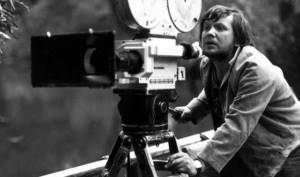
Young director Sergei Solovyov
After graduating from the institute with honors in 1969, he got a job at Mosfilm, where his film adaptation of Gorky’s play “Yegor Bulychev and Others” was soon released.
The next work of the young director and screenwriter was the film “The Station Agent,” in which actress Marianna Kushnerova, his second wife, starred. The film was highly acclaimed at prestigious film festivals and brought Solovyov widespread recognition.
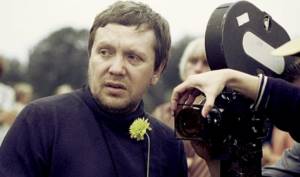
Sergei Soloviev in his youth
The success was cemented by the release of the touching film “One Hundred Days After Childhood,” on the set of which Soloviev met his third wife, the young actress Tatyana Drubich. This film added several more honorary awards to Sergei Alexandrovich’s collection, including the 1975 Berlin Film Festival award for best director.
However, Soloviev received the status of a cult director thanks to the unofficial trilogy “Three Songs about the Motherland,” which included the famous film “Assa” (1987), the sarcastic “Black Rose - the Emblem of Sadness, the Red Rose - the Emblem of Love” (1989) and the tragicomedy “The House Under starry sky" (1991). Although this was later, and at the time of the premiere of the same “Assa,” critics, without mincing words, called the director “an opportunist who clings to the younger generation and sucks their blood.”
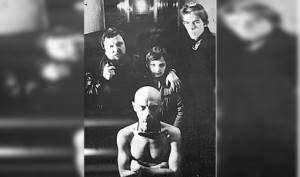
Sergei Solovyov on the set of the film “Assa”
All films are united by the theme of perestroika changes in Soviet society, and they are also related by a similar cast: the director’s muse Tatyana Drubich, Alexander Abdulov, Alexander Bashirov.
After the collapse of the USSR, a crisis began in cinema, as well as throughout the country, and Solovyov switched to theater. Together with German colleagues, he staged several performances based on the works of Chekhov (“Uncle Vanya”, “The Seagull”, “Three Sisters”), and devoted the remaining time to working on scripts for the films “Crazy Woman” by Alexander Trofimov and “Prison Romance” by Evgeny Tatarsky .
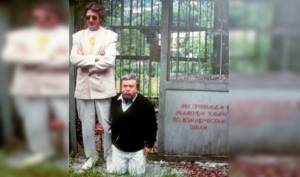
Sergey Soloviev and Alexander Abdulov
In the first half of the 90s, he also hosted a series of documentary programs on RTR dedicated to Russian cinema. Also, together with Abdulov, he worked on organizing the Moscow International Film Festival.
At the beginning of the 2000s, the master returned to directing and made several more striking films, including the drama “Tender Age” (2000) with his son Dmitry Solovyov in the title role, in which Solovyov again reflected the tragedy of a particular person against the backdrop of the “mafia” 90s , as well as “Anna Karenina” in 2008 with Tatyana Drubich and Oleg Yankovsky.
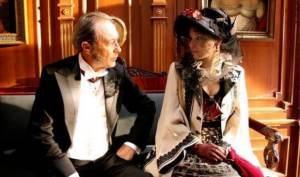
Still from Anna Karenina by Sergei Solovyov
In 2009, the director finished work on the film “Assa-2”. At the center of the plot was the heroine of the first “Assy” Alika, who served time for the murder of Krymov (in the first part he was played by Stanislav Govorukhin) and became an actress. However, this work failed to win the audience's love. “It’s sad, but Sergei Shnurov took the place of Viktor Tsoi,” sad fans of the first part.
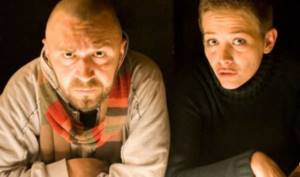
Sergei Shnurov played in the continuation of “Assa”
In 2010, Soloviev unexpectedly turned to the comedy genre in the film “Odnoklassniki”, the stars of which were Aristarkh Venes and Konstantin Kryukov. This picture, like most of the director’s works, told about the conflict between fathers and children, and the idea for the script belonged to his student Sofia Karpunina, who played the main female role in the film.
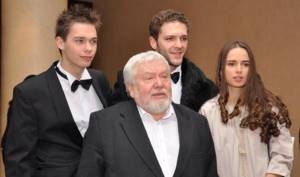
Sergei Solovyov at the premiere of the film "Odnoklassniki"
From 2010 to 2014, the director had his own show “SAS: Those with whom I am” on the “Culture” channel. The program was dedicated to the bright moments from Solovyov’s biography, or more precisely, to the people with whom his life brought him together at one time or another.
Sergei Alexandrovich is the author of many books and articles on the theory and history of cinema, teaches at VGIK, and hosts his own television program. He is the People's Artist of the Russian Federation and the owner of many other honorary titles and awards.
Sergei Solovyov (film director)
Sergei Alexandrovich Solovyov. Born on August 25, 1944 in Kemi (Karelo-Finnish SSR; now in the Republic of Karelia). Soviet and Russian film director, screenwriter, producer, teacher, TV presenter. Honored Artist of the RSFSR (1976). People's Artist of the Russian Federation (1993).
Sergei Solovyov was born on August 25, 1944 in the city of Kem (Karelo-Finnish SSR, now the Republic of Karelia) into a military family.
Father - Alexander Dmitrievich Solovyov (1905-1956) was the head of the Smersh department of the Karelian Front.
Immediately after the war, his father was sent to North Korea (until 1947 he was an adviser to the leader of the North Korean state, Kim Il Sung), where Sergei lived until he was six years old.
Then the family moved to Leningrad, where Sergei Solovyov grew up.
At the age of 14, he accidentally met the trainee director of the Bolshoi Drama Theater Igor Vladimirov, who was looking for teenagers for the production of “The Boundless Distance” based on the play by N.E. Virts (premiered on November 15, 1958). And soon he began to appear on stage together with famous actors of the BDT troupe, which at that time was led by Georgy Tovstonogov.
We recommend: Sarik Andreasyan
Together with classmate Lev Dodin, he studied at the Theater of Youth Creativity (TYUT) at the Leningrad Palace of Pioneers under the direction of Matvey Dubrovin.
In 1960-1962 he worked on Leningrad television as a worker.
The desire to become a film director arose after watching the cult film “The Cranes Are Flying.” He was dissuaded by Tovstonogov himself, who predicted a great acting career for Solovyov. But he decided in his own way. And in 1962, Sergei Solovyov became a student at VGIK.
In 1969 he graduated from the directing department of VGIK, workshop of M. Romm and A. Stolper.
Even in his second year, Sergei Solovyov wrote the script for the documentary “Look at the Face.” The film was shown at the Leipzig Film Festival in 1963, the jury awarded the work of the 19-year-old director a gold medal.
His graduation work was the comedy film anthology “Family Happiness” of four short stories (in addition to this, the film was shot by Alexander Shein and Andrei Ladynin), a film adaptation of stories by Anton Pavlovich Chekhov. The main roles were played by Alisa Freindlich, Vyacheslav Tikhonov, Nikolai Burlyaev. He himself recalled this work: “I was always lucky in the actors, and therefore in the friends. The first almost always became the second. This happened from the very beginning, when, while still filming my graduation film, I received consent to play the main role from Vyacheslav Tikhonov, who has since become a friend to me, a boy compared to him. Although he and I are not only different ages, but also quite different people.”
In 1969-1987 - director of the Mosfilm film studio, author of scripts for feature films and documentaries.
In 1971 he directed the drama “Yegor Bulychov and Others.” And in 1972 he directed the film “The Station Agent,” a film adaptation of the story of the same name by Alexander Pushkin. The main role was played by Nikita Mikhalkov. The film received the Grand Prix at the Venice Television Film Festival.
Sergei Soloviev in his youth
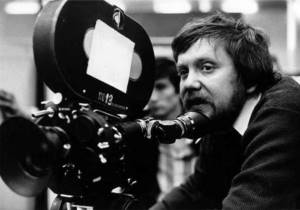
His 1975 film “One Hundred Days After Childhood,” a drama about the life of teenagers in a pioneer camp, was even more successful. The film was highly rated by film critics and was called “one of the most representative films of the decade,” Fr. The film collected many prizes: 1975 - XXV IFF in West Berlin: Silver Bear Prize for best director's work; 1975 - XVII IFF in Avellino: Silver medal for a film for children and youth; 1976 - IX All-Union Film Festival in Frunze: Main Prize (equally with the film “When September Comes”), Prize for cinematography; 1976 — IFF “FEST-76” in Belgrade: Main prize for the best director’s work in the competition of films for children and youth; 1976 - Lenin Komsomol Prize; 1976 - Prize of the Central Committee of the Komsomol "Scarlet Carnation" for the best film of 1975 for children and youth.
Honored Artist of the RSFSR (December 31, 1976).
In 1977, for the film “One Hundred Days After Childhood” there was a USSR State Prize for the author of the script, director, cameraman and artist of the film.
Since 1987 - head of the Krug association at Mosfilm.
Member of the jury of the Venice Film Festival in 1981 and 1987.
In the same 1987, the director presented his most famous film, “Assa,” which became one of the main events in the cultural life of the USSR during perestroika and the beginning of a trilogy, continued with the films “Black Rose - the Emblem of Sadness, Red Rose - the Emblem of Love” (1989) and “House Under the Starry Sky” (1991). These films capture the atmosphere of the last years of the USSR. “Assa” became a “cult” for the Soviet rock movement, thanks to the use of compositions by the groups “Aquarium”, “Kino”, “Bravo” in the soundtrack and participation in the film by Viktor Tsoi. The film was released in April 1988, and by the end of the year the film was watched by 27 million viewers.
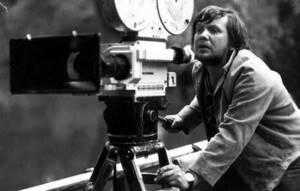
In the early 1990s he staged the plays “Uncle Vanya” (Maly Theater) and “The Seagull” (Commonwealth of Taganka Actors).
People's Artist of the Russian Federation (12/16/1993).
In 1994-1997 - Chairman of the Investigative Committee of Russia.
In 1994 - President of the Moscow IFF.
In the 1990s, he hosted original programs on television - “SAS” and “SAS. Those with whom I..."
In 2004, the director filmed three stories by A.P. Chekhov, releasing the film “About Love”.
In 2009, he presented his film adaptation of Leo Tolstoy’s novel Anna Karenina . The premiere took place on February 25, 2009 during the closing of the VII International Festival of Cinematic Debuts “Spirit of Fire”. This was the last film with the participation of Alexander Abdulov and one of the last film works of Oleg Yankovsky. The main character was played by Tatyana Drubich. The director himself explained why he took her for the role of Anna Karenina: “...they often ask me: “What were you guided by when you cast Tanya Drubich for the role of Karenina?” I answer: “Similarity!” For example, I really love the previous “Anna Karenina”. Because Tatyana Samoilova looked fantastically like Anna. Looks like it! It was impossible to find a more similar actress than Tatyana Samoilova at that time. Smoktunovsky looked like Hamlet. What can you do here - it looks like that's all! An actress more similar to Anna Karenina than Tatyana Drubich cannot be found today. It was the degree of her similarity that inspired me for this project.”
In 2010, Sergei Solovyov presented the youth film Odnoklassniki. The co-author of the script was his student Sofya Karpunina, who also appeared in the title role.
Sergey Solovyov and Sofya Karpunina
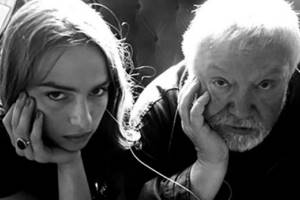
In 2016, he directed the film “Ke-dy,” an adaptation of the story “Paradise found” by prose writer Andrei Gelasimov.
Sergei Solovyov is known as a director who has his own acting “clip”. A number of actors acted with him more than once. The director’s muse in many films, starting with the film “One Hundred Days After Childhood,” was Tatyana Drubich. It is also worth noting the creative relationships with Lyudmila Savelyeva, Alexander Bashirov, Alexander Abdulov, Ilya Ivanov, Alexander Zbruev.
In 2002, he initiated the creation of the international festival of cinematic debuts “Spirit of Fire” in Khanty-Mansiysk and became its permanent president.
Sergei Solovyov teaches at VGIK at the directing department, heads the directing and acting workshops, and is a professor.
“For me... there are only two social institutions that have not compromised themselves - art and God’s Scripture,” said the director.
“Art is when you know what no one knows, and you film about it. The world is ruled by the soul, and money... I won’t say anything. But Russian art has never developed by genre. Russia is our “genre” in which we all live. Such a terribly difficult to define space,” says Soloviev.
“I have never made a movie for anyone other than myself and everyone,” he noted.
Sergey Soloviev
Sergei Solovyov's height: 153 centimeters.
Personal life of Sergei Solovyov:
Was married three times.
The first wife is Ekaterina Sergeevna Vasilyeva, Soviet and Russian theater and film actress, People's Artist of the RSFSR. She was his classmate. The lovers had to wander around corners, communal apartments and hostels. The marriage quickly broke up, they separated, remaining true friends.
Sergey Soloviev and Ekaterina Vasilyeva
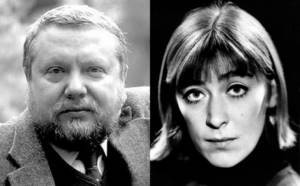
The second wife is Marianna Kushnerova, film critic and actress. In 1972, she played the main role of Dunyasha in his film The Station Agent.
The marriage produced a son, Dmitry Solovyov (October 6, 1974 - February 12, 2018), an actor. He starred in his father’s film “A Tender Age.”
Marianna was having a hard time with the divorce; according to rumors, she was even in a psychiatric clinic. She never got married again.
Sergey Soloviev and Marianna Kushnerova
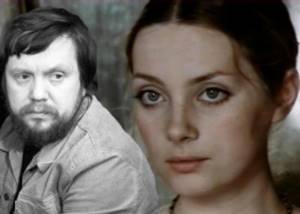
Son, actor and producer Dmitry Solovyov died on February 12, 2018 at the age of 43. The cause of death was pancreatitis - a possible complication after the flu suffered by Dmitry. Farewell to him took place on February 14 in the Church of St. John the Evangelist on Bronnaya, Dmitry Solovyov was buried at the Troekurovsky cemetery.
We recommend: Alexey Agranovich about cinema, children and life together
Dmitry Solovyov - son of Sergei Solovyov
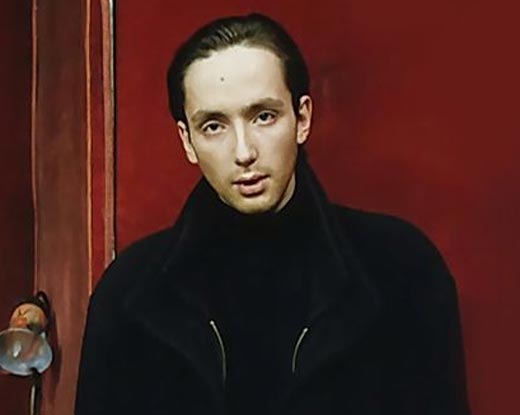
The third wife is Tatyana Lyusenovna Drubich (born June 7, 1960), Russian theater and film actress. They met during the filming of the film “One Hundred Days After Childhood,” directed by the then 28-year-old Soloviev, and the main role was played by 13-year-old Tanya Drubich. The novel was a shock to everyone - both those around him and Tatyana’s parents: 15 years of age difference, a married man and a schoolgirl. Solovyov's second wife complained about him to the city party committee.
The marriage was registered in 1983.
On June 27, 1984, the couple had a daughter, Anna Drubich, a composer, pianist, graduated from the Munich Conservatory in piano, is engaged in concert activities, and also composes music, in particular for cinema. Lives in Los Angeles (USA).
They divorced in 1989, but remained friends and maintained a creative tandem.
Sergey Soloviev and Tatyana Drubich
Filmography of Sergei Solovyov:
1987 - Profession - cameraman (documentary) 1994 - To be remembered. Inna Gulaya (documentary) 1994 - To be remembered. And yet... (documentary) 1991 - Genius - cameo (uncredited) 2000 - Sergei Bondarchuk (documentary) 2002 - Notes on the margins of a lifestyle (Pastabos gyvenimo būdo paraštėse) (documentary) 2002 - Attraction - episode 2005 - Alexander Kaidanovsky. Tragedy of the Stalker (documentary) 2005 - How the idols left. Gennady Shpalikov (documentary) 2005 - How idols left. Leonid Filatov (documentary) 2005 - How idols left. Mikhail Romm (documentary) 2006 - How idols left. Evgeny Matveev (documentary) 2006 - The story of Leonid Filatov (documentary) 2006 - The last hero of the outgoing era (documentary) 2006 - Pavel Timofeevich Lebeshev. An unfinished play... (documentary) 2006 - Leonid Filatov. I can’t live anymore (documentary) 2006 - Gleb Panfilov. Its own topic (documentary) 2007-2011 - Islands (documentary) 2007 - How the idols left. Andrei Tarkovsky (documentary) 2008 - I am walking around Moscow. Gennady Shpalikov (documentary) 2008 - Memory of happiness (documentary) 2008 - Cinema for two (documentary) 2008 - Innokenty Smoktunovsky against Prince Myshkin (documentary) 2008 - The ingenious hermit. Eternal music of Schwartz (documentary) 2008 - Man in the frame. Alexander Abdulov (documentary) 2009 - Oleg Yankovsky. Starring (documentary) 2009 - Alexander Abdulov. Romance with life (documentary) 2009 - Man in the frame. Tatyana Drubich (documentary) 2010 - The meaning of life is life itself (documentary) 2010 - Lyudmila Savelyeva. After the ball (documentary) 2010 - Ingeborga Dapkunaite. Without complexes and bad habits (documentary) 2010 - And the moment is filled with eternity... (documentary) 2010 - Ekaterina Vasilyeva. Flying from shadow to light (documentary) 2010 - Documentary camera. School film as a document of time (documentary) 2010 - Viktor Tsoi. The Legend of the Last Hero (documentary) 2011 - Film wars in Soviet style (documentary) 2011 - The history of film bosses, or Builders and Perestroika (documentary) 2011 - Alexander Kaidanovsky. Mysteries of Stalker (documentary) 2013 - Those with whom I am. Valery Levental (documentary) 2013 - “Seventeen Moments of Spring.” Last take (documentary) 2013 - Georgy Burkov. Ironic Don Quixote (documentary) 2013 - Alexander Abdulov. With you and without you (documentary) 2014 - Secrets of Soviet cinema. Assa (documentary) 2014 - Alisa Freindlich. There is no explanation for the miracle (documentary) 2021 - Secrets of cinema. Sorcerers (documentary)
Voiced by Sergei Solovyov:
2000 - Tender Age - voice of the narrator
Directing works of Sergei Solovyov:
1969 - Family Happiness (film almanac) 1971 - Yegor Bulychov and others 1972 - Station Agent 1975 - One Hundred Days After Childhood 1976 - Melodies of the White Night (白夜の調べ) 1980 - Rescuer 1982 - Heiress in a Line 1982 - Chosen Ones, The / Elegidos, Los) 1986 - Alien white and pockmarked 1987 - Assa 1989 - Black rose - the emblem of sadness, red rose - the emblem of love 1991 - House under the starry sky 1993 - Uncle Vanya (film-play) 1994-2002 - Ivan Turgenev. Metaphysics of love (was not completed) 1994 - Three sisters 2000 - Tender age 2003 - About love 2008 - 2-Assa-2 2009 - Odnoklassniki 2009 - Anna Karenina 2021 - K-dy
Scenarios by Sergei Solovyov:
1966 - Take a look at the face (documentary) 1967 - Return (Short) 1969 - Family Happiness (Kinoalmans) 1971 - Egor Bulychov and others 1972 - Station career 1975 - one hundred days after childhood 1976 - Melody of the White Night (白夜 の 調べ 調べ 調べ 調べ 調べ 調べ 調べ) 1980 - Rescuer - Rescuer 1982 - Heiress in a straight line 1982 - The Chosen Ones (Chosen Ones, The / Elegidos, Los) 1983 - When they played Bach (short film) 1986 - Alien white and pockmarked 1987 - Assa 1988 - Black Monk 1989 - Black rose - the emblem of sadness, red rose - emblem of love 1989 - Days of Man (Cilvēka dienas) 1991 - House under the starry sky 1993 - Prison romance 1994-2002 - Ivan Turgenev. Metaphysics of Love (was not completed) 1994 - Three Sisters 2000 - Tender Age 2000 - Bremen Town Musicians and So 2003 - About Love 2008 - 2-Assa-2 2009 - Odnoklassniki 2009 - Anna Karenina 2021 - K-dy
Producer works of Sergei Solovyov:
1993 - Uncle Vanya (film-play) 2003 - About love 2008 - 2-Assa-2 2009 - Odnoklassniki 2009 - Anna Karenina 2021 - K-dy
Bibliography of Sergei Solovyov:
Volume 1. “The Beginning. This and that...” Volume 2. “Is it okay, what am I smoking?” Volume 3. “Word for word” Collection of own scripts “2-INFERNO-2” Life at the speed of 1/100 of a second
Prizes and awards of Sergei Solovyov:
1972 - Station Agent - Grand Prix at the Venice Television Film Festival; 1975 - One Hundred Days After Childhood - “Silver Bear” for best director, Berlin Film Festival; 1975 - One Hundred Days After Childhood - USSR State Prize; 1980 - Rescuer - Special Jury Citation, Venice Film Festival; 1986 - Alien White and Pockmarked - Special Jury Prize, Venice Film Festival; 1983 - Straight Heir - Gold Medal, Children's Film Festival in Salerno, Italy; 1987 - Assa - Special Jury Prize at the San Sebastian IFF; 2009 - At the Yerevan International Film Festival “Golden Apricot” was awarded a special “master of his craft” award; 2021 — Prize for contribution to world cinema at the Moscow International Film Festival
This excerpt (second) is taken from the article: https://tass.ru/info/1397645
Personal life of Sergei Solovyov
Solovyov’s passionate, addictive nature could not help but affect his personal life. Sergei Alexandrovich's first wife was classmate Ekaterina Vasilyeva, as freedom-loving and independent as he himself. They got married while still at the institute, but soon the actress left him for Mikhail Roshchin.
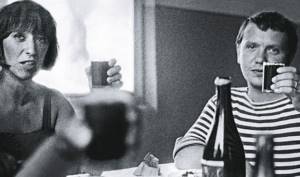
Sergey Soloviev and Ekaterina Vasilyeva
Solovyov quickly found comfort in the arms of actress Marianna Kushnerova, who became his second wife. The family idyll was interrupted by the 28-year-old director’s acquaintance with 14-year-old Tanya Drubich on the set of the film One Hundred Days of Childhood.” The girl captivated the director so much that he completely forgot about his legal wife. Neither the birth of his son Dmitry, nor the prayers and suffering of Marianna, nor severe reprimands from the party line could force him to end his relationship with Drubich.
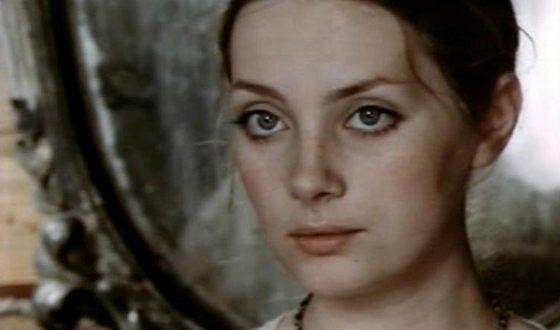
Marianna Kushnerova - the second wife of Sergei Solovyov
Their secret romance lasted for almost eight years, until in 1983 they officially registered the relationship - a friend of the director proposed to Tatyana, and Solovyov, fearing that his beloved would be “taken away,” decided to do the same.
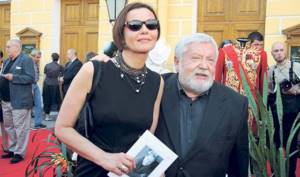
Sergey Soloviev and Tatyana Drubich
Tatyana became not only the director’s wife, but his muse, who played the brightest female roles in his best films. In 1984, the couple had a daughter, Anya (now she is a composer who writes music for films), but six years later they separated. According to Tatyana, the reason for the divorce was her affair with director Ivan Dykhovichny. At the same time, Soloviev himself claimed in later interviews that he and Drubich were still together.
After the divorce, Soloviev continued to film her in his films: Polina Viardot in “The Metaphysics of Love” (the film was not completed), “Assa-2”, “Anna Karenina”, during the filming of which Drubich celebrated her half-century anniversary.
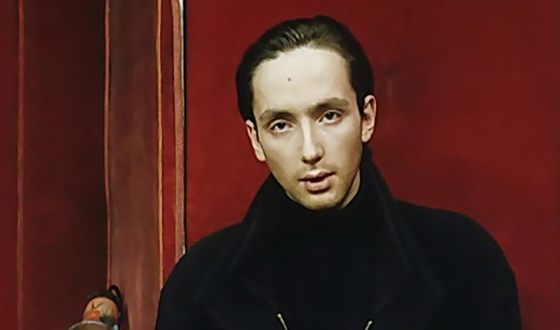
Dmitry Solovyov - son of Sergei Solovyov
At the beginning of 2021, all three ex-wives of the director met at the funeral of Dmitry Solovyov, the eldest son of Sergei Alexandrovich, who died of pancreatitis.
Personal life
Despite his short stature (168 cm with a weight of 80 kg), as can be seen in the director’s photo, Sergei Solovyov has always enjoyed the interest of the opposite sex. The director's first wife was actress Ekaterina Vasilyeva. He fell in love with a red-haired and talented classmate, but did not dare to open up. Friend Eduard Volodarsky helped, telling Vasilyeva about her secret admirer. He also told Sergei that Katya agreed to become his wife. The students got married in their 2nd year, but soon separated, managing to maintain friendly relations.
The director’s second wife was Marianna Kushnerova, who played a role in his second film, “The Station Agent.” The actress gave birth to her husband's son Dmitry. The personal life of the spouses did not work out; they separated.
View this post on Instagram
A post shared by ?Movie Magazine (@impressions_of_movie) on Oct 31, 2021 at 4:30am PDT
Sergei Solovyov and Tatyana Drubich
For many years, Tatyana Drubich, Solovyov’s third wife, became the master’s muse. They met on the project “One Hundred Days After Childhood.” At the time of their acquaintance, the director was 28, Tatyana was 14. A scandal broke out, because a relationship with an underage girl threatened Solovyov with serious consequences, including criminal ones.
Sergei Soloviev decided to take Tatyana to the registry office when she turned 23 years old. In 1984, Drubich gave birth to her husband’s daughter Anna. After 5 years, the couple divorced, but continued to work together.
In February 2021, a tragedy struck the director’s family - Dmitry Solovyov, his son from his second marriage, died. The cause of death of the 43-year-old actor was a complication from the flu in the form of pancreatitis.
View this post on Instagram
A post shared by pro-zvezdu.ru All about the stars (@pro_zvezdu) on Nov 5, 2021 at 12:39am PST
The first wife of Sergei Solovyov, Ekaterina Vasilyeva,
the director had a hard time with this loss. In the spring, his chronic illnesses worsened, which is why he had to go to the hospital. A stomach ulcer caused Sergei Alexandrovich to bleed, so surgery was needed. During this difficult period, the director was supported by his ex-wife Tatyana Drubich. According to him, the actress “literally pulled him out of the other world.” Now the director’s health has stabilized, but he did not celebrate his 75th birthday.


